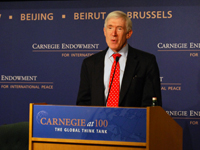Registration
You will receive an email confirming your registration.
IMGXYZ3129IMGZYXUnder Secretary Robert D. Hormats, co-chair of the U.S.-Russia Bilateral Presidential Commission’s working group on innovation, discussed progress in the U.S.-Russia economic relationship following the G8 summit meeting in France between Presidents Barack Obama and Dmitri Medvedev. Carnegie’s Ambassador James F. Collins moderated.
Encouraging a Larger Economic Role for Russia
One of the primary goals of U.S.-Russian economic cooperation is to encourage Russia to play a greater role in the world economy, Hormats said. Over the last twenty years, Russia has played a more active part in the global economic framework as a member of organizations like the IMF and the World Bank. Now, U.S. economic engagement with Russia is accelerating, which both sides view as a positive development.
Russia’s Accession to the WTO and Permanent Normal Trade Relations
- Mutual Benefit: The United States supports Russia’s accession to the World Trade Organization (WTO), Hormats said, adding that the process is on a positive track. Russia’s membership is an area where the two countries’ interests largely coincide. Despite some domestic criticism of WTO accession from those who think that the economic costs of WTO accession will outweigh the benefits for certain sectors, Russia as a whole will benefit from WTO membership, Hormats asserted. Some benefits to Russia would include access to new markets and recourse to the WTO’s dispute resolution and negotiating mechanisms. Furthermore, Russia’s accession to the WTO would also benefit the United States by increasing access to the Russian market for American exporters and improving the stability and predictability of trade arrangements.
- Benefit for U.S. Exporters: Russia’s expanding consumer base provides a growing market for U.S. exporters, but the United States cannot fully benefit from this as long as Russia remains outside normal trade rules. WTO rules would reduce the various restrictions Russia imposes on U.S. exports such as meat and poultry, with the result that American exports to Russia could potentially double, Hormats said.
- Jackson-Vanik Amendment: To take full advantage of Russia’s WTO membership, Hormats explained that the United States must extend permanent normal trade relations to Russia by terminating the Jackson-Vanik amendment, a 1974 law that denies normal trade relations to countries that restrict freedom of emigration. Although Russia has human rights problems, the Jackson-Vanik amendment is a relic of the Cold War and not a good way to address these issues, Hormats said. The Obama administration will work with Congress to graduate Russia from the Jackson-Vanik amendment and establish permanent normal trade relations with the country as early as this year, he added.
Russia’s Modernization Agenda
- U.S.-Russia Collaboration: Innovation can be a tool of economic engagement between the United States and Russia, through collaboration in cutting-edge fields like biomedical research and smart-grid technology. It is also important for the two countries to collaborate on the development of Skolkovo, an innovation hub based outside Moscow, because its success can have broader positive effects in Russia, Hormats noted.
- Continued Reforms Needed: Additional reforms are critical for Russia’s economic success, Hormats said, outlining several areas for improvement:
- A level playing field: The ongoing dominance and large market share of state-supported companies hurts both Russian and foreign companies, which often cannot compete, Hormats noted. As Russia seeks to modernize and attract foreign direct investment, it must work to level the playing field among companies, especially in protected industries like agriculture and automobiles.
- Institutional changes: To attract foreign investment and protect entrepreneurs at home, Russia must create a more friendly business climate by strengthening intellectual property rights and increasing transparency, Hormats said.
- Positive policy direction: Acknowledging that challenges remain, Hormats added that he is encouraged by Moscow’s overall economic policy direction. Economic modernization is a priority for the Russian government, which recognizes that modernization and economic diversification are key to sustaining economic growth, he said. Medvedev has prioritized modernization in five sectors:
- Energy efficiency
- Nuclear technology
- Information technology and telecommunications
- Aerospace
- Pharmaceuticals
